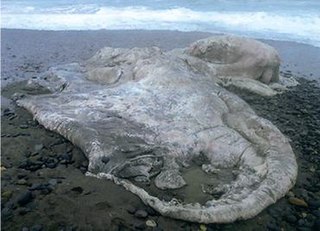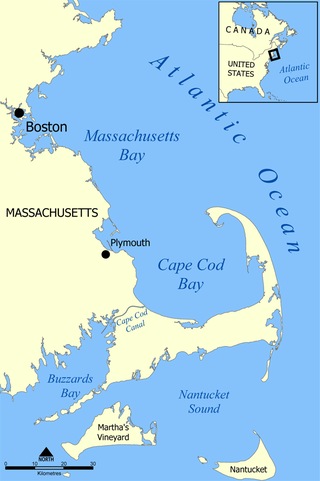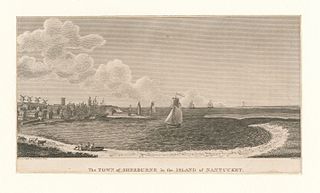
The Nantucket Blob was a globster that washed ashore on Nantucket Island, Massachusetts, in November 1996. [1] Analysis of samples in 2004 suggests that the Nantucket Blob was a large mass of adipose tissue from a whale. [2]

The Nantucket Blob was a globster that washed ashore on Nantucket Island, Massachusetts, in November 1996. [1] Analysis of samples in 2004 suggests that the Nantucket Blob was a large mass of adipose tissue from a whale. [2]

Moby-Dick; or, The Whale is an 1851 novel by American writer Herman Melville. The book is the sailor Ishmael's narrative of the maniacal quest of Ahab, captain of the whaling ship Pequod, for vengeance against Moby Dick, the giant white sperm whale that bit off his leg on the ship's previous voyage. A contribution to the literature of the American Renaissance, Moby-Dick was published to mixed reviews, was a commercial failure, and was out of print at the time of the author's death in 1891. Its reputation as a Great American Novel was established only in the 20th century, after the 1919 centennial of its author's birth. William Faulkner said he wished he had written the book himself, and D. H. Lawrence called it "one of the strangest and most wonderful books in the world" and "the greatest book of the sea ever written". Its opening sentence, "Call me Ishmael", is among world literature's most famous.

Nantucket is an island about 30 miles (50 km) south from Cape Cod. Together with the small islands of Tuckernuck and Muskeget, it constitutes the Town and County of Nantucket, a combined county/town government in Massachusetts, a U.S. state.

Thomas Gibson Nickerson was an American sailor and author. In 1819, when he was fourteen years old, Nickerson served as cabin boy on the whaleship Essex. On this voyage, the ship was sunk by a whale it was pursuing, and the crew spent three months at sea before the survivors were rescued. In 1876 he wrote The Loss of the Ship "Essex", an account of the ordeal and of his subsequent experiences at sea. The manuscript was lost until 1960, and was first published in 1984.

The Chilean Blob was a large mass of tissue found on Pinuno Beach in Los Muermos, Chile in July 2003. It weighed 13 tonnes and measured 12 metres (39 ft) across. The Chilean Blob made headlines around the world because biologists were initially unable to identify it, and were speculating that it was the remains of some species of giant octopus previously unknown to science.

Essex was an American whaling ship from Nantucket, Massachusetts, which was launched in 1799. In 1820, while at sea in the southern Pacific Ocean under the command of Captain George Pollard Jr., the ship was attacked and sunk by a sperm whale. Thousands of miles from the coast of South America with little food and water, the 21-man crew was forced to make for land in the ship's surviving whaleboats.

Scrimshaw is scrollwork, engravings, and carvings done in bone or ivory. Typically it refers to the artwork created by whalers, engraved on the byproducts of whales, such as bones or cartilage. It is most commonly made out of the bones and teeth of sperm whales, the baleen of other whales, and the tusks of walruses.

Pequod is a fictional 19th-century Nantucket whaling ship that appears in the 1851 novel Moby-Dick by American author Herman Melville. Pequod and her crew, commanded by Captain Ahab, are central to the story, which, after the initial chapters, takes place almost entirely aboard the ship during a three-year whaling expedition in the Atlantic, Indian and South Pacific oceans. Most of the characters in the novel are part of Pequod's crew.

Owen Chase was first mate of the whaler Essex, which a sperm whale rammed and sank on November 20, 1820. Chase wrote about the incident in Narrative of the Most Extraordinary and Distressing Shipwreck of the Whale-Ship Essex. This book, published in 1821, would inspire Herman Melville to write Moby-Dick. Chase was born in Nantucket, Massachusetts, the son of Phebe (Meader) and Judah Chase.

A globster or blob is an unidentified organic mass that washes up on the shoreline of an ocean or other body of water. A globster is distinguished from a normal beached carcass by being hard to identify, at least by initial untrained observers, and by creating controversy as to its identity.
Nantucket High School is a public high school in Nantucket, Massachusetts, United States. It is the only high school on the island of Nantucket. The school serves students in grades 9–12 and has an approximate enrollment of 530 students. The school colors are Navy Blue and White, and the mascot is Hank the Harpoon Man, whose name was chosen by the students in 2013.

The Nantucket was a 350-ton whaler built in Nantucket, Massachusetts in 1837. First master, David N. Edwards, 1837-40, then: George Washington Gardner, 1841–45; Benjamin C. Gardner, 1845–50; Richard C. Gibbs 1850-54 ; Richard C. Gibbs (1855–59).

Bermuda Blob is the name given to two globsters that washed ashore on Bermuda in 1988 and 1997. Originally thought to be the remains of a cryptid, analysis proved the blobs to be the remains of whales.

The Islands is the collective name for the set of large islands south of Cape Cod in the southeast corner of the U.S. state of Massachusetts: Nantucket, Martha's Vineyard, the Elizabeth Islands, and a small number of minor islands. The Islands are the location of numerous beach resorts, celebrity second homes, and preserved buildings dating back to the whaling era.

Nantucket Sleighride is the second studio album by American hard rock band Mountain, released in January 1971 by Windfall Records in the US and by Island in the UK.
A Nantucket sleighride is the dragging of a whaleboat by a harpooned whale while whaling. It is an archaic term from the early days of open-boat whaling, when the animals were harpooned from small open boats. Once harpooned, the whale, in pain from its wound, attempts to flee, but the rope attached to the harpoon drags the whalers' boat along with it. The term refers to Nantucket, Massachusetts, the center of the American whaling industry; as well as the speed associated with riding in a horse-drawn sleigh. The term wasn't used by whalemen themselves, but was probably invented by a late 19th-century journalist.

Commercial whaling in the United States dates to the 17th century in New England. The industry peaked in 1846–1852, and New Bedford, Massachusetts, sent out its last whaler, the John R. Mantra, in 1927. The Whaling industry was engaged with the production of three different raw materials: whale oil, spermaceti oil, and whalebone. Whale oil was the result of "trying-out" whale blubber by heating in water. It was a primary lubricant for machinery, whose expansion through the Industrial Revolution depended upon before the development of petroleum-based lubricants in the second half of the 19th century. Once the prized blubber and spermaceti had been extracted from the whale, the remaining majority of the carcass was discarded.

Nantucket shipbuilding began in the late 1700s and culminated in the construction of notable whaling ships during the early 19th century. Shipbuilding was predominantly sited at Brant Point. Whaling ship construction concluded in 1838.

The Nantucket Whaling Museum is a museum located in Nantucket, Massachusetts. It is run by the Nantucket Historical Association. The Whaling Museum is the flagship site of the Nantucket Historical Association’s fleet of properties.

The Sivuch'i Rocks are a group of barren islets and rocks on the eastern side of Uda Gulf, in the western Sea of Okhotsk.

The citizens of Nantucket during the American Revolutionary War era relied on whaling, industries that supported whaling, and the trade in oil that resulted from that industry. Because most of this trade was with England, the leading citizens of Nantucket chose to be neutral during the American Revolutionary War, siding neither with those who supported revolution nor with the British Crown, in order to maintain the viability of the island's economy. The Quaker culture of pacifism was a secondary cause of the island's non-participation in revolutionary activities.